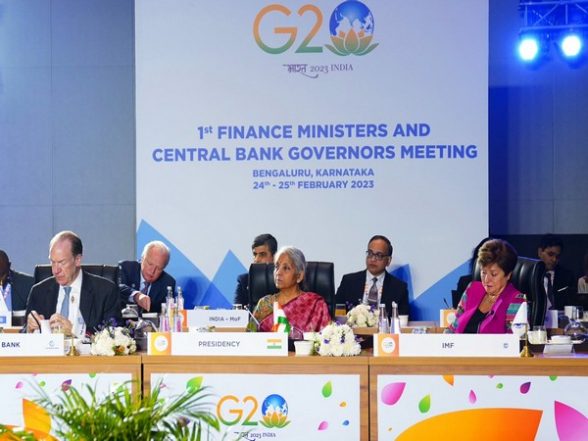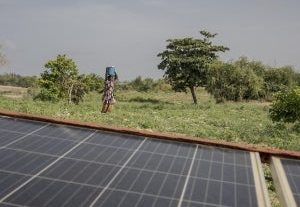Bengaluru (Karnataka)[India], February 25 (ANI): The Finance Ministers and Central Bank Governors of G20 countries, met on February 24-25 in Bengaluru under the Indian Presidency’s theme of “One Earth, One Family, One Future”, and committed to enhancing international policy cooperation and steering the global economy towards securing strong, sustainable, balanced and inclusive growth.
According to a statement — G20 Chair’s Summary and Outcome Document — released by G20 members on Saturday, since February 2022 they have witnessed the Russia-Ukraine conflict that further adversely impacted the global economy. There was a discussion on the issue, it said.
Also Read | 4 Overs Gone. @TeluguWarriors1 Are 56/2.
They Need 59 from 36 Balls to Win!
#A23 … – Latest Tweet by Ccl.
The members said, “We reiterated our national positions as expressed in other fora, including the UN Security Council and the UN General Assembly, which, in Resolution No. ES-11/1 dated March 2, 2022, as adopted by majority vote (141 votes for, 5 against, 35 abstentions, 12 absent), deplores in the strongest terms the aggression by the Russian Federation against Ukraine and demands its complete and unconditional withdrawal from the territory of Ukraine.”
Most members strongly condemned the war in Ukraine and stressed that it is causing immense human suffering and exacerbating existing fragilities in the global economy – constraining growth, increasing inflation, disrupting supply chains, heightening energy and food insecurity, and elevating financial stability risks. There were other views and different assessments of the situation and sanctions. Recognising that the G20 is not the forum to resolve security issues, the members acknowledged that security issues can have significant consequences for the global economy.
Also Read | Arbaaz Khan Reveals Why He Chose To Start His Career As Villain in Daraar.
The members in the statement said they would continue to explore the macro-financial implications of the potential introduction and widespread adoption of Central Bank Digital Currencies (CBDCs), and their effects on cross-border payments, as well as on the international monetary and financial system.
In the meantime, the members welcomed the conclusion of debt treatment for Chad and call for a swift conclusion of the work on debt treatment for Zambia and Ethiopia and looked forward to the rapid formation of the official creditor committee for Ghana to work on the requested debt treatment. “Further, we look forward to a swift resolution to Sri Lanka’s debt situation,” the statement added.
The statement said, “We recall and reaffirm the commitment made by developed countries to the goal of mobilizing USD 100 billion climate finance per year by 2020 and annually through 2025 to address the needs of developing countries, in the context of meaningful mitigation actions and transparency in implementation and stress the importance of meeting that goal fully as soon as possible.”
The G20 delegations said they were deeply anguished by the tragic loss of life and destruction across south-eastern Turkiye from the devastating earthquakes on February 6 and stand in solidarity with the Turkish people.
The statement further said the members also conveyed their deepest sympathy to the Syrian people, who were likewise affected by the catastrophic earthquakes and extended condolences to the bereaved families. “We appreciate the humanitarian assistance already being provided and call upon members and multilateral institutions to continue providing all possible assistance for recovery and reconstruction,” it said.
Since the meeting in October 2022, the members in the statement said the global economic outlook had modestly improved. “However, global growth remains slow, and downside risks to the outlook persist, including elevated inflation, a resurgence of the pandemic and tighter financing conditions that could worsen debt vulnerabilities in many Emerging Market and Developing Economies (EMDEs),” the statement said.
The members said they, therefore, reiterated the need for well-calibrated monetary, fiscal, financial, and structural policies to promote growth and maintain macroeconomic as well as financial stability. “We will continue to enhance macro policy cooperation and support the progress towards the 2030 Agenda for Sustainable Development,” the statement added.
As agreed by leaders in Bali, the members said, “We reaffirm the importance of staying agile and flexible in our policy response. We will use macroprudential policies, where required, to safeguard against downside risks. We will prioritise temporary and targeted fiscal support to vulnerable groups while maintaining medium-term fiscal sustainability. Central banks remain strongly committed to achieving price stability, in line with their respective mandates.”
According to the statement, the members said, “They (central banks) will ensure inflation expectations remain well anchored and will clearly communicate policy stances to help limit negative cross-country spillovers. Central bank independence is crucial to maintaining policy credibility.”
“We recognise the importance of supply-side policies, especially policies that increase labour supply, boost growth and alleviate price pressures. We reaffirm our April 2021 exchange rate commitments,” the statement said, adding “We reaffirm the importance of the rules-based, non-discriminatory, fair, open, inclusive, sustainable and transparent multilateral trading system with the World Trade Organization (WTO) at its core in restoring growth and job creation, and reiterate our commitment to fight protectionism, and encourage concerted efforts for reform of the WTO.”
The statement further said, “Multilateral Development Banks (MDBs) play a key role in development financing. While maintaining their focus on poverty reduction and all other Sustainable Development Goals (SDGs), we recognise the need for MDBs to evolve given the scope and complexity of transboundary challenges and the resultant increase in demand on their lending resources, knowledge support, and for catalysing private investment.”
The member said they would work to strengthen MDBs towards this end. “We take note of the World Bank’s Roadmap for evolving the Bank’s mission, operational approach, and financial capacity within their country engagement model and call upon other MDBs to report on their efforts to address similar challenges,” the statement said.
The members said they look forward to receiving the report of the Expert Group proposed by the G20 Indian Presidency for deliberations on this issue in our third meeting in 2023. Taking forward the mandate given by the G20 Leaders in Bali, G20 members tasked the International Financial Architecture Working Group to work with the MDBs to develop a G20 Roadmap, for implementing the recommendations of the G20 Independent Review of MDBs Capital Adequacy Frameworks (CAF) based on updates from MDBs in Spring 2023. (ANI)
(This is an unedited and auto-generated story from Syndicated News feed, LatestLY Staff may not have modified or edited the content body)



